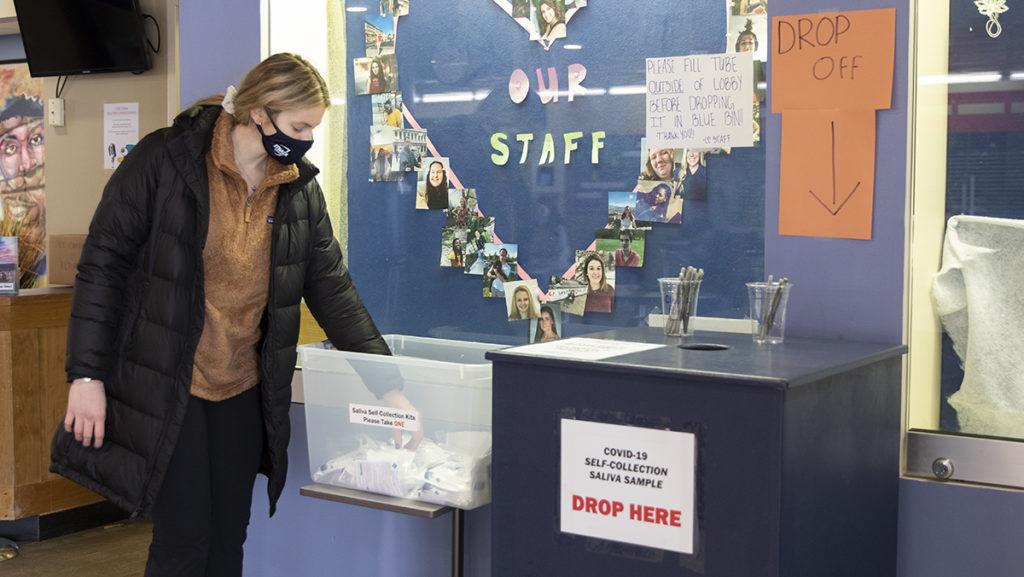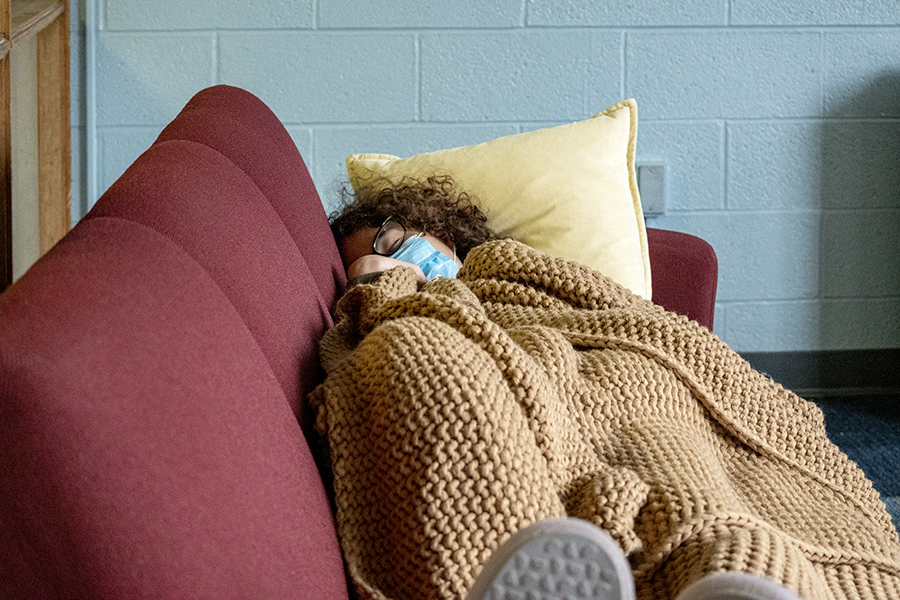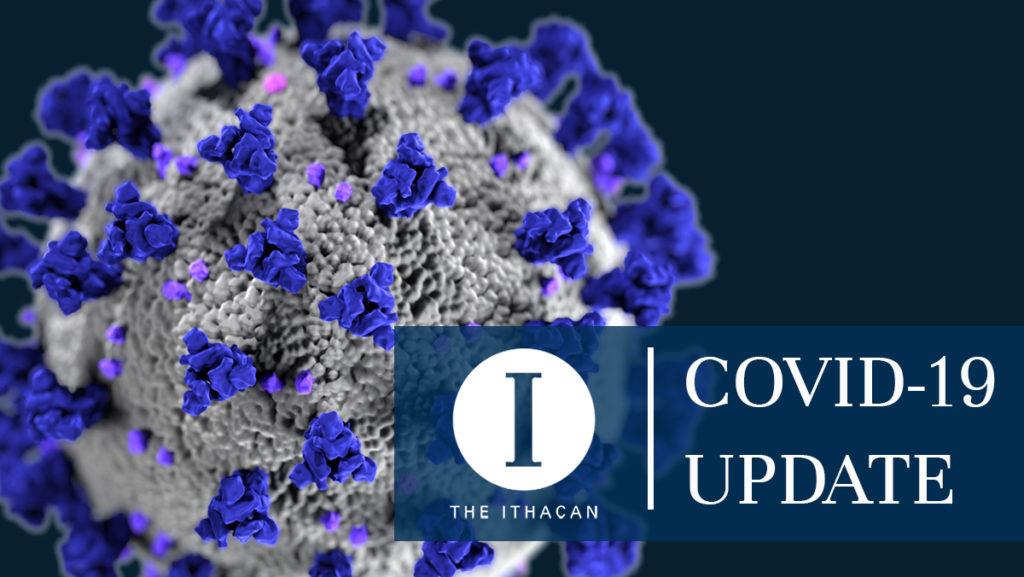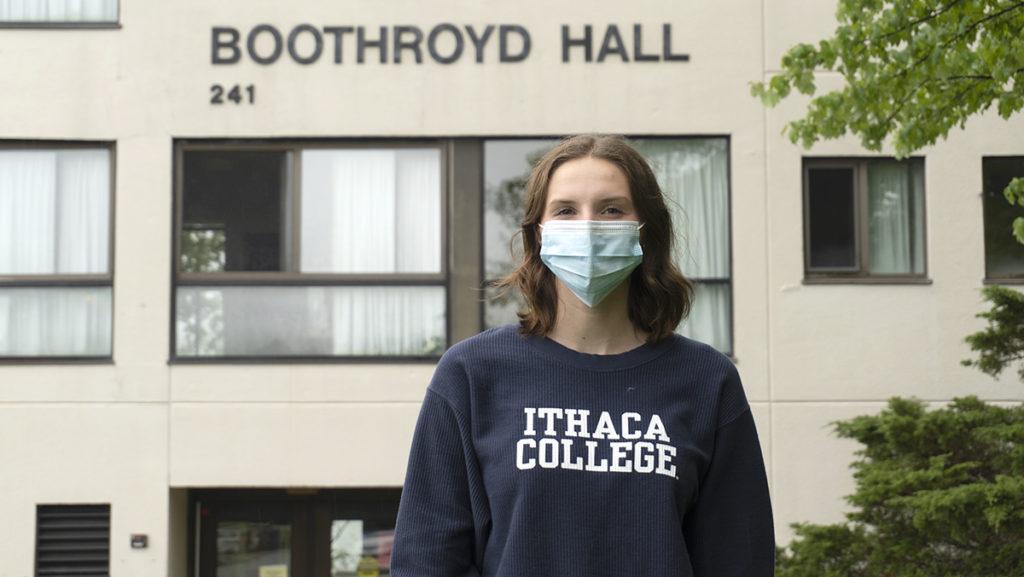Ithaca College has been implementing its quarantine and testing plans for the spring semester.
Students began a phased move-in Jan. 7 that concluded Feb. 5. All classes were held virtually from Jan. 25 to Feb. 5 and in-person classes began Feb. 8. The college has released extensive quarantine and isolation plans, contact tracing and testing plans as part of the Return to Campus Plan.
Residential students quarantine and isolation
Emerson Hall is being used for quarantine and isolation for COVID-19 positive students and close contacts. Close contact is defined as being within six feet of a COVID-19 positive person for a period of at least 10 to 30 minutes or more depending on the exposure. Students who test positive need to isolate. People in isolation are required to isolate for 10 days after symptoms first appear, according to the Centers for Disease Control and Prevention (CDC). People can leave isolation after 10 days and after at least 24 hours of no fever without fever-reducing medication and after symptoms have improved.
Quarantine is for those who may have been exposed to a COVID-19 positive person. Quarantine can prevent the further spread of the virus within the campus and wider community. Students may need to quarantine in Emerson Hall for at least 10 days if they are asymptomatic or longer if symptoms develop.
The college will provide quarantine and isolation students with food, laundry, sanitation, medical and mental health support. Students in quarantine or isolation are not allowed to leave their room and cannot leave until cleared by the Tompkins County Health Department (TCHD).
Students should bring essential items they would need for an extended stay in Emerson Hall including academic items, personal hygiene items, entertainment and snacks.
If a cluster of cases occurs on campus, a public notification would be sent out to alert the campus community, Christina Moylan, director of public health and emergency preparedness, said in an email Feb. 1.
Off-campus students quarantine and isolation
Off-campus students will have to quarantine or isolate in their off-campus residence or make another arrangement for somewhere they can quarantine or isolate. Students should have cleaning supplies, groceries and medications to last at least two weeks in case of the need to quarantine or isolate. Off-campus students are not allowed to quarantine or isolate in Emerson Hall.
The college expects all off-campus students who are quarantining or isolating to not leave their residence until cleared by TCHD.
Testing
COVID-19 testing for the spring semester is done through a saliva self-collection process. Samples should be collected on the day they will be dropped off. The tests must be dropped off before 11:30 a.m. Monday through Friday in the Athletics and Events Center, the Campus Center, Terrace 13 or the Peggy Ryan Williams Center.
Students must be tested twice a week and can pick a schedule that works best for them. Monday and Thursday, and Tuesday and Friday are examples.
Results take approximately 24 to 48 hours to be shared with students, and all testing is done through Cayuga Health System (CHS). CHS notifies students and the college when students are cleared to access campus. If a student tests positive, a contact tracer from either TCHD or the college will notify the student and start the contact tracing process. After a positive case is confirmed, Moylan will initiate a protocol to alert everyone who may have come into contact with the person. These could include dining facilities, academic contacts and residence hall residents.
Badge System
The college has begun using a badge system to monitor student’s compliance with COVID-19 testing and completing the daily health screening. Different locations across campus may require students to show their badge in order to enter. The Ithaca College Library and Fitness Center may require students to show their badge status. Entering classrooms, athletic practices and the dining halls may also require students to show their status.
There are five different badge status types. They are: cleared or green, meaning students have completed their testing and daily health screening; overdue or yellow, meaning either testing or the daily health screening is overdue and needs to be completed; quarantine or orange, meaning student is in quarantine due to being considered a close contact; isolation or red, meaning student is in isolation due to a positive test result; and not applicable or blue, meaning the badge is not enabled.
Students can access their badge after completing the daily health screening or through the Hammond Health Center portal.
Contact tracing
Members of the campus community are expected to participate in contact tracing efforts done by either the Hammond Health Center or TCHD. Students may be asked questions in regard to their medical information, potential exposure to COVID-19, symptoms, other close contacts and demographic information.
Employees who work in high or direct contact positions need to be tested weekly and employees in low or no direct contact positions need to be tested every other week.
Vaccines
New York state is currently in Phase 1B of the vaccination process. This phase includes individuals 65 and older, first responders or support staff for first responder agencies, people who work in correctional facilities, childcare workers, P-12 school staff, public transit officials and people who live or work in homeless shelters.
Local health departments have been instructed to prioritize essential workers for Phase 1B and pharmacies to focus on vaccinating individuals over 65.
People can get vaccinated through CHS, state-operated sites or pharmacies. Tompkins County received 700 doses for essential workers in Phase 1B — workers in P–12 schools and childcare and public facing grocery store workers — for the week of Feb. 8. Starting Feb. 15, health departments may vaccinate individuals with comorbidities based on supply. The Tompkins County Health Department will clarify next week’s distribution following notification of the number of available doses from New York state.
During the first two weeks of remote instruction for Spring 2021, from Jan. 25 to Feb. 5, there were reports of COVID-19 guideline violations at the college. In this period, there have been 17 positive cases recorded by the college. Updated COVID-19 information for the college, Cornell University and Tompkins County can be found at theithacan.org/covid-tracker.
As of Feb. 9, there are 10 active cases at the college, six are residential students, one is an off-campus student, two are staff members and one is a faculty member. There are 18 students in public health quarantine and isolation and three in travel advisory quarantine. Tompkins County has 211 active cases and a total of 3,216 cases since March 2020, as of Feb. 10. There have been 8,336 people that have received the first dose of the vaccine and 4,490 individuals who have received the second dose.
Masks
The college is asking students to stop using the face masks that it provided because they do not meet the expected quality standards.
Students returning to campus were provided with two face masks as a part of the Ithaca College Reopening Plan. Christina Moylan, director of public health emergency preparedness, sent an email to students Feb. 10 requesting that they return the masks to collection bins that are located at the COVID-19 test drop–off sites. These sites are at the Athletics and Events Center, the Campus Center, Terrace 13, the Circles Community Center, the Peggy Ryan Williams Center and Terrace Dining Hall.
Students have voiced concerns about the quality of the masks given to them, and several posted videos on social media showing that they were able to blow out a flame through the mask. Some researchers have recommended people test the quality of their mask by attempting to blow out a candle while wearing the mask. If the flame is easily blown out, the mask is likely not effective at limiting the spread of COVID-19.
Students who need a mask can pick up three-ply disposable procedural masks at the Office of Residential Life, the Campus Center information desk, Terrace 13 and each dean’s office, Moylan said in the email.
The email also addressed questions about “double masking.” Dr. Anthony Fauci, director of the National Institute of Allergy and Infectious Diseases and member of the White House Coronavirus Task Force, recommended that people wear two masks at the same time to increase their effectiveness. Moylan’s email said there is no official guidance on “double masking” but recommends that students who choose to wear two masks wear a surgical or procedural mask as the first layer and a cloth mask as the second layer.












